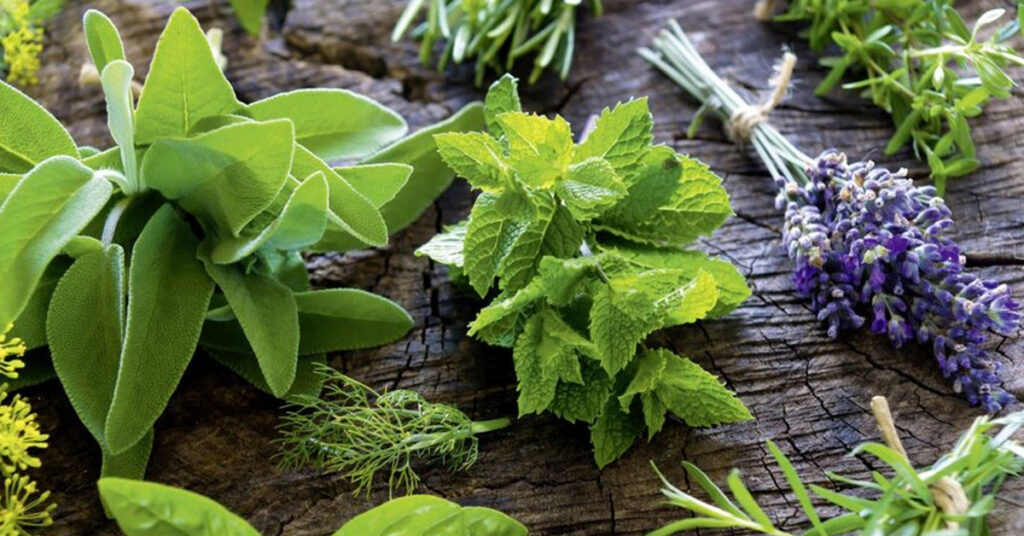Many of the following healing herbs may be growing in your backyard. But are you familiar with their power for the well-being of your body?
Sometimes is better to be prepared with the knowledge of what nature has to offer us, rather than reaching for the medicine cabinet. In some cases, herbal remedies may be a safer alternative.
For example, the well-known chamomile. The calming effects of chamomile have been used forever. It is safe to be used by anyone old, or young, even babies. One study shows that chamomile extract can have closely the same effect as sleeping pills for those suffering from insomnia.

Likewise, peppermint oil is as adequate as prescription drugs for relieving irritable bowel syndrome, but without the possibly harmful side effects. Multiple studies have shown that ginger eases morning sickness, sage can lessen a sore throat, and hibiscus tea can help in case of high blood pressure.
As a strong believer that nature is our best medicine, I give you a list of 20 healing herbs and what are they good for. Check your herbs and spices cabinet, I am sure that you have at least one of these natural remedies.
Table of Contents
Ashwagandha
(Withania somnifera) is a herb that has anti-inflammatory properties. Can help in reducing anxiety. Immunity booster and invigorating tonic.
Black Cohosh
(Actaea racemosa) is a herb that will benefit the ladies, as it helps with menstrual cramps and it is suggested to be used when dealing with menopausal symptoms. Also, it relieves arthritic pain.
Calendula
(Calendula officinalis) is best used for healing wounds. A herb that you can use to relieve oral inflammation. Inflammation in the mouth and throat. Helps with stomach inflammation. Can be used as ointment or cream for rashes and irritation.
Catnip
(Nepeta cataria) is your herb if you are tense and have anxiety issues. Also soothes if you have an upset stomach.
Cranberry
(Vaccinium macrocarpon) if you ever suffer from a urinary tract infection this is your go-to herb. It can also help with chronic prostatitis.
Echinacea
(Echinacea spp.) is a herb that has strong antiviral and immune-boosting properties. Helps with upper respiratory infections, as well as common colds.
Elderberry
(Sambucus nigra, S. Canadensis) flowers of this herb are a well-known remedy for fever and colds. Extracts from the fruit of this herb have great antiviral properties and are especially valuable against flu.
Garlic
(Allium sativum). Probably you have garlic in your kitchen at this moment, so you already have a very powerful antimicrobial that you can use while fighting off cold or nasty sinus congestion. The use of garlic has many benefits for the health, another benefit is the help in lowering blood pressure.
Ginger
(Zingiber officinale) is a superstar among the herbs. You can use ginger for easing nausea, vomiting, and upset stomach. Ginger tea lessens cold and flu symptoms.
Ginseng
(Panax quinquefolius; P. ginseng) is a herb that can be particularly useful for mental and physical fatigue. Can reduce commonness and severity of colds. Could be beneficial with erectile dysfunction.
Hibiscus
(Hibiscus sabdariffa) is a herb traditionally used in tea form to relieve sore throats and cold symptoms. But it also has its benefit with high blood pressure issues and it has mild diuretic activity.
Hops
(Humulus lupulus) is a herb that can help with sleep issues. Also with the right dosage can ease tension, anxiety, and restlessness. And if you suffer from hot flashes as a menopause symptom, this is your herbal remedy.
Lemon Balm
(Melissa officinalis) is a herb that has a calming effect and is great in relieving tension. Helps with colic and digestion issues. Topical creams made from lemon balm can be used for fever blisters.
Licorice
(Glycyrrhiza glabra) is a herb with great anti-inflammatory properties. Best herb to use in case of sore throat and cough as it soothes mucous membranes. Also good in protecting and healing the gastrointestinal tract.
Marshmallow
(Althaea Officinalis) root and leaves of this herb are rich in mucilage, a substance that coats the lining of the mouth and throat, as well as the tissue that lines the gastrointestinal tract. You can use Marshmallow herb when you have heartburn, sore throat. But also if you have minor GI inflammation.
Milk Thistle
(Silybum marianum) is a herb that shields the liver from harm caused by environmental toxins, medications, and alcohol. Recent studies suggest it protects the kidneys too.
Mullein
(Verbascum thapsus). The herb leaves can be used to ease cough, sore throat, also chest congestion. And for earache, you can use the flowers of this herb steeped in oil.
Sage
(Salvia officinalis) is a herb that helps with the common cold, sore throat, and ease cough. There are studies that support the use of this herb for hot flashes as a result of menopause. A herb that helps with night sweats and excessive sweat issues.
St. John’s Wort
(Hypericum perforatum) is a herb that can be used as a natural alternative treatment for mild to moderate depression. It can also help with PMS symptoms.
Thyme
(Thymus vulgaris) is a herb with powerful antimicrobial and antispasmodic properties. This herb can be of great help with colds, coughs, and congestion.
This list is just a glimpse of how nature can help with many health issues.
